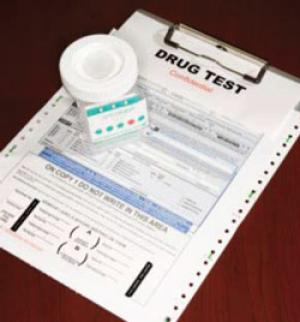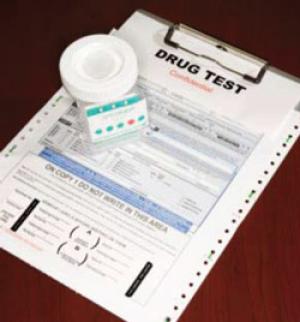Frustrated with federal and legislative attacks on medical marijuana providers, some Montana activists want to just go for it and legalize marijuana for all, or at least all adults. They're gathering signatures now to do just that.
The "Show-Me Cannabis Regulation" campaign to put a marijuana legalization initiative on the November ballot in the Show-Me State is in the signature-gathering stage.
Indiana legislators found themselves voting to drug test themselves in a bid to get a welfare drug testing bill passed. It worked, and now the bill heads for the state Senate.
First, Florida's Republican legislature approved drug testing of poor people. Now it wants to do the same to state workers, and remove some of their collective bargaining rights along the way.
Hopes that things are quieting down in Ciudad Juarez are fading after a bloody week there. And that's just one front in Mexico's drug wars.
From action in state legislatures to raids at dispensaries, there's no let-up in the medical marijuana action around the nation. Here's the latest.
The California Regulate Marijuana Like Wine initiative got 62% support in a new poll, which could make it more attractive to major donors. But the clock is ticking on it and all the other marijuana legalization initiatives in the state.
Voters in Washington state will have the chance to legalize marijuana this November, after Initiative 502 was certified for the ballot Friday.
It looks like an uphill battle for marijuana legalization in Michigan this year if a new poll is an accurate reflection of voter sentiments.
A new CDC report has some surprising findings about the links between gang killings and drugs.
More dope-dealin' and/or sticky-fingered cops this week, plus a tweaker judge gets sentenced.
A Detroit-area man who tried to drive away from a drug arrest was shot and killed by a deputy hanging onto his car door. He becomes the sixth person to be killed in US domestic drug law enforcement operations so far this year.
Events and quotes of note from this week's drug policy events of years past.
Provoked by heavy-handed federal raids and prosecutions aimed at medical marijuana providers and prodded on by the Republican-dominated state legislature's virtual repeal-disguised-as-reform of the state's voter-approved medical marijuana law, Montana advocates are now rolling out an initiative campaign for a constitutional amendment that would legalize marijuana in Big Sky County.
Now organized as
Montana First, this is largely the same group of activists and supporters who last summer and fall organized
the successful signature-gathering campaign to put the
IR-124 initiative on the November 2012 ballot. That initiative seeks to undo the legislature's destruction of the state medical marijuana distribution network.
And now they're back for more, and they're cutting to the chase.
Constitutional Initiative No.110 (CI-110) is short and sweet. It would add two sentences to the state constitution: "Adults have the right to responsibly purchase, consume, produce, and possess marijuana, subject to reasonable limitations, regulations, and taxation. Except for actions that endanger minors, children, or public safety, no criminal offense or penalty of this state shall apply to such activities."
In addition to those two sentences, the actual ballot language informs voters which part of the constitution is to be amended, notes that "federal criminal laws regarding marijuana will not be changed by the passage of this initiative," and specifies that it would go into effect July 1, 2013, if approved by the voters.
Passage of the initiative would not directly repeal the state's marijuana laws, but would render them moot, a legal vestige of a bygone era, like laws requiring that horses in front of bars be tethered to rail posts.
"The personal use of marijuana should never result in criminal penalties," explained Barb
Trego, a former deputy reserve sheriff in Lewis & Clark County and the measure's proponent. "Whatever you think about marijuana, it's easy to see that we have higher priorities for our law enforcement resources," she said.
"This measure is as simple as it can be," she continued. "The basic principle is clear as day. After voters pass it, there will be work to do to define limits and regulations. This is an appropriate task for elected leaders after the voters signal their preference to stop arresting and jailing adults for personal use of marijuana."
To qualify for the ballot, campaigners need to gather some 45,000 valid voter signatures, and Montana law also requires that those signatures include 10% of voters in at least 40 of 100 of the state's electoral districts. They have until June 22.
While campaigners can point with pride to the successful signature-gathering campaign of a few months ago, this time around, it is going to be more difficult, for a couple of reasons. First, because this is a constitutional initiative, organizers will have to gather more than double the number of signatures they needed for I-124. Second, because the state's once thriving medical marijuana distribution industry has been decimated by state and federal action, the opportunities for fundraising within the industry have largely evaporated.
"We anticipate a mostly volunteer effort; we just don't see any way to have a paid signature-gathering effort, said Montana First treasurer John Masterson, who is also the founder and head of
Montana NORML. "We'd like to be able to pay six or seven zone coordinators, people we can count on to work long hours and oversee the petition effort, and we'd like to raise enough money to retain a consulting firm that specializes in making the ballot."
While relying on volunteer efforts to get an initiative on the ballot is usually a death knell for campaigns in high population states -- in California you need more than 500,000; in Michigan, more than 322,000 -- Montana is a different story. Last year's signature-gathering campaign was almost entirely all-volunteer, and it generated a cadre of nearly a thousand petitioners. That's a relatively large activist base for a state with not quite a million residents.
And then there's Montana itself, with its tradition of rugged individualism and suspicion of government. This year, for example, other initiatives being circulated include one that would allow for jury nullification and one that would "reserve to the people" -- not the legislature -- the right to amend or repeal initiatives, as well as a legislative initiative that would bar mandated health insurance purchases that is already set for the ballot.
"Montana is highly independent," said Masterson, "and it's not just a right-wing thing. Our Democratic
Gov. Schweitzer opposed REAL ID. Montana really values its independence, and these continuous and ongoing federal intrusions have people of all political stripes outraged."
It's hard to say what will happen, said political consultant and communications specialist Kate
Chowela, who was deeply involved with both the IR-124 campaign and the
Montana Cannabis Industry Association, but who is "not officially tied to anybody" right now.
"We need bigger signature numbers than last year, and we've been taking a real beating here," she said. "It will depend on whether people are beaten down or whether they feel called to stand up in the face of injustice. And this is happening in a very dynamic world with a lot of instability as well, with the state of the economy, Occupy Wall Street, the elections. All of these things bump up against and influence each other."
"The people in Montana found out they were not safe, the businesses weren't safe, the patients weren't safe, even being a legislator isn't safe,"
Chowela said, referring to
the recent news that the DEA was investigating state legislators for supposed links to marijuana distribution conspiracies. "To some extent, this is the citizens coming back and looking for a way to make their position clear and look for a sense of safety that we have lost completely."
"We believe our initiative really solves a big part of the marijuana problem in America," said Masterson. "By eliminating all penalties for responsible adult use, we send a message to the federal government that if you want to prohibit this plant, Montana does not agree and will not participate in your campaign. That's how alcohol Prohibition crumbled. We think that
Montanans will see that a regulated marijuana commerce and the right of adults to access marijuana is far preferable to the harm and damage caused by prohibition, to say nothing of the waste of our police resources."
The petitions have been printed up, the volunteers are hitting the pavement, and the clock is ticking down toward June. A legalization initiative has already been approved for the ballot in Washington, and one is awaiting almost certain certification in Colorado. Similar initiative campaigns are already underway in California, Michigan, Missouri, and Oregon, but Montana could be the best bet for making it a legalization initiative
trifecta come November.
back to top
A Missouri campaign to place an initiative to end marijuana prohibition on the November ballot has entered the signature-gathering phase, and petition-toting volunteers across the Show Me state are hunting for registered voters as the campaign looks for funds to help it get over the top. The effort is off to an enthusiastic start.
"Nearly 500 trained petitioners have now hit the streets," said campaign director and Kansas City area coordinator Amber Langston. "I'm happily overwhelmed with the enormous response we've received since launching our initiative."
The campaign is called
Show-Me Cannabis Regulation (
SMCR), and was put together by attorney Dan
Viets, a long-time marijuana reformer and a member of the national
NORML Legal Committee and board of directors, Missouri
NORML chapters, and other marijuana legalization advocates and supporters.
The initiative, a constitutional amendment, calls for marijuana legalization for persons 21 and over, a process for licensing marijuana production and sales establishments, and allows the legislature to enact a tax of $100 a pound on retail sales. It also includes a provision lifting criminal justice system sanctions against people imprisoned or under state supervision for nonviolent marijuana offenses that would no longer be illegal and the expunging of all criminal records for such offenses. The initiatives would also allow for the use of marijuana for medical reasons by minors (with parental consent).
Petitioners must obtain the signatures of a number of registered voters equal to 8% of the total votes cast in the 2008 governor's race from six of the state's nine congressional districts. The campaign said that comes out to about 144,000 valid signatures, which means it needs to collect 200,000 or more to have a reasonable margin of comfort. Signatures must be turned in by May 6.
"We just started training volunteers in December, and we've been hitting it hard for the last three weeks," said St. Louis-area campaign coordinator John Payne. "We've gathered about 10,000 signatures already, and we're confident we're on pace to meet our targets," he added.
"It's an all-volunteer effort at this point," but
SMCR doesn't intend for it to stay that way, said Payne. "We think we can get this on the ballot for a half a million dollars or so, and then, it's just a matter of getting the right message across."
The campaign doesn't yet have any state-level polling to bolster its case, but plans to do so shortly. In the meantime, it points to
last October's Gallup poll, which showed, for the first time in history, a majority of Americans support legalizing cannabis for personal use with 50% in favor nationwide and 54% in the Midwest.
"We've raised a few thousand dollars already and have some funders who will hopefully be putting a fairly large sum of money in our account," Payne said. "We've been operating on a shoe string, but we're gearing up for more. We have an established campaign and a lot to show for what we've done so far on the cheap. If there are any donors out there looking for a good place to invest, they should take a look at us."
The campaign reports no sign of organized opposition at this point, but is casting a wary eye on one of the state's bigger economic interests: the beer brewers.
"We know
the beer lobby put up money against Proposition 19. If we see any organized opposition, we expect it to come from the brewers," Payne said. "But if Bud and Busch get involved, we think most people will see through that as self-interested."
The campaign is also keeping an eye on the
Missouri Narcotics Officers Association, whose
Jason Grellner seems to be the go-to guy on drug issues for the media, including the initiative campaign, said Payne. But maybe law enforcement opposition can be blunted, he suggested.
"Our most effective argument has been the public safety argument -- every minute a police officer spends arresting someone for smoking a joint is a minute not spent on rape or murder or armed robbery," said Payne. "We need to focus our law enforcement resources on more important things; lots of people get that, even if they're not sympathetic."
Economic arguments are also part of the arsenal, Payne said.
"This is a state where we've repeatedly had to cut the budget because of tax shortfalls, and we can show we could be saving about $100 million a year," he explained, citing economist Jeffrey
Miron's report on the budgetary implications of prohibition for the states. "That resonates."
Then there are potential tax revenues. A $100 a pound tax on retail sales could generate not insignificant funds for the state, but some consumers grumble a bit at the prospect, Payne said.
"The potential revenues are a selling point for some people," he said; "for others, it's a bit of a turnoff, but they don't not sign the petitions."
SMCR and its army of volunteers has 14 weeks to get the job done, or to snare major funding to ensure the job gets done. But there's some serious competition for big donor dollars out there. Legalization initiatives in Colorado and Washington have already handed in enough signatures to appear set to make the ballot, and there are also legalization initiative campaigns in California, Michigan, and Oregon, as well as a new California medical marijuana initiative.
Can Show-Me Cannabis Regulation show the rest of us how to get it done? Stay tuned.
back to top
The Indiana House Tuesday passed a bill that would create a pilot program for drug testing welfare recipients, but not before finding itself forced to vote for drug testing for its own members. The bill, House Bill 1007, now moves to the Senate.
The bill, sponsored by Rep. Jud
McMillin (
R-Brookville), was on the verge of passage last week when Democratic legislators managed to pass an amendment to require drug and alcohol tests for legislators, causing
McMillin to pull the bill last Friday. He brought it back Monday, but with an amendment to strip out the drug testing language for legislators and replace it with different testing language.
Under
McMillin's amendment, the alcohol testing provision for legislators is gone, but half the legislature would face random drug testing each year. The House speaker and Senate president pro
tem could also order drug tests of members. Members who refused a drug test could lose perks, such as their laptops, parking spaces, and franked mail.
The bill would set up a pilot program in three counties, where recipients of Temporary Assistance to Needy Families (
TANF) would have to undergo random,
suspicionless drug tests. If they test positive, they would be denied benefits for one year. On Monday, though, the House unanimously approved an amendment by Rep. Gail
Riecken (D-Evansville), that would allow people to continue to receive
TANF benefits after testing positive if they go into drug treatment and pass subsequent drug tests.
back to top
In Tallahassee, drug testing fever seems to know no bounds. Companion bills that would mandate random, suspicionless drug testing of state employees were on the agenda last week, and both passed out of committees in their respective chambers. Republican legislators also used the bills to attack state workers collective bargaining rights.
The latest legislative drug testing effort comes even as a state law passed last year to force welfare applicants and recipients to pass drug tests has been temporarily blocked by a federal court pending a final decision and as Republican
Gov. Rick Scott's executive order last year to drug test state employees is in limbo awaiting litigation.
This week's drug testing bills,
House Bill 1205 and
Senate Bill 1358, would give state agencies the option of randomly drug testing their employees quarterly. Bill supporters argued that the legislation would give state agencies the ability to drug test workers just as private employers do.
"State employees are not different from other employees," and should be subjected to drug tests just like private workers, said state Sen. Alan Hays (
R-Umatilla), the sponsor of the senate bill.
The bills authorize state agencies to require all employees to submit to periodic random drug testing and would allow them to fire workers who test positive or mandate they undergo drug or alcohol treatment at their own expense.
The bills also remove "the definition of the term 'safety-sensitive position'" and remove "provisions limiting the circumstances under which an agency may discharge an employee in a special risk or safety-sensitive position." And for good measure, the bills "delete provisions relating to public employees' collective bargaining rights for drug testing."
Some members of the committee said they were concerned the bill could be challenged on constitutional grounds, but they were outvoted. The House bill passed out of the Government Operations Committee on a 9-4 vote, and the Senate bill passed out of the Health Regulation Committee on a 6-1 vote. Both bills face further committee votes before going to the floor.
back to top
by Bernd Debusmann Jr.
Mexican drug trafficking organizations make billions each year smuggling drugs into the United States, profiting enormously from the prohibitionist drug policies of the US government. Since Mexican president Felipe Calderon took office in December 2006 and called the armed forces into the fight against the so-called cartels, prohibition-related violence has killed more than 50,000 people, including more than 15,000 in 2010 and another 15,000 last year. The increasing
militarization of the drug war and the arrests or killings of dozens of high-profile drug traffickers have failed to stem the flow of drugs -- or the violence -- whatsoever. The
Merida initiative, which provides $1.4 billion over three years for the US to assist the Mexican government with training, equipment and intelligence, has so far failed to make a difference. Here are a few of the latest developments in Mexico's drug war:
Thursday, January 26
In
Ciudad Juarez,
a man was shot and killed inside a restaurant in front of dozens of customers. Several people who were with the victim ran from the scene.
Friday, January 27
In Nuevo Laredo,
four gunmen and a soldier were killed during a fire fight. The incident began when gunmen traveling in six vehicles opened fire on an army patrol. Five soldiers were wounded and taken to a local hospital.
In
Ciudad Juarez,
at least ten people were murdered in several incidents. Ten more would be killed on Saturday.
Saturday, January 28
In
Torreon,
five people were gunned down by a group of men wielding assault rifles. Four other individuals were wounded in the incident.
In Monterrey, three bodies were found dead along with a message from a criminal organization.
Monday, January 30
In
Sinaloa,
the commander of army forces in the state said that marijuana and poppy growers have been severely hampered by drought and that his forces are detecting fewer grow sites than in previous years. Another army spokesman said that the drought did not mean a drop-off in overall cartel production.
In Nuevo Leon,
police announced the capture of a suspected Zeta who allegedly confessed to killing 75 people, at least 36 of whom were taken from passenger
buses. Enrique
Elizondo Flores, "El
Arabe," was arrested on January 20 but authorities say they delayed the announcement to give them time to verify his claims. Over 90 people were killed in three bus attacks thought to have been carried out by the
Zetas in January and March 2011.
In
Ciudad Juarez,
at least seven people were killed. In one incident, three gunmen were killed in a fire fight after attacking the police. At least eight municipal police officers have been killed in January in attacks that have been blamed on the New Juarez Cartel. In other incidents, a couple was murdered in an industrial park, a man was shot dead on a bus, and a body was found in a car after having been kidnapped on Sunday.
In
Guasave,
Sinaloa,
three soldiers were killed during a fire fight with armed men. According to reports, an army patrol was chasing several vehicles with armed men who resisted. Several gunmen were also reported killed but the bodies were taken away. A pickup truck and several weapons were left abandoned at the scene. After the shooting, a tense standoff took place between soldiers and municipal police forces, who had ignored distress calls from the soldiers involved in the shooting.
In Monterrey,
seven suspected Zetas were arrested on kidnapping and other charges. Two victims were rescued from their safe house.
Tuesday, January 31
In Mexico City,
a top official confirmed that an army general and 29 of his troops are on trial for crimes they committed while operating in the
Ojinaga, Chihuahua border area in 2008 and 2009. General Manuel Moreno and his underlings are accused of committing at least 10 killings and reselling seized narcotics, as well as stealing property during raids. They were originally charged in August 2009.
Off the coast of California,
a motorboat laden with over a ton of marijuana was intercepted by authorities. Three Mexican nationals were arrested.
In Mexico City,
Mexican prosecutors announced that three former
Tamaulipas governors are being investigated. Authorities have declined to say why exactly the men are being investigated, however.
[
Editor's Note: We are no longer going to keep a running tally of the death toll; the figures are too unreliable. The latest figures below were released by the Mexican government in January.]
Total Body Count for 2007 (
approx.): 4,300
Total Body Count for 2008 (
approx.): 5,400
Total Body Count for 2009 (
approx.): 9,600
Total Body Count for 2010 (official): 15,273
Partial Body Count for 2011 (official): 12,093*
Total Body Count (official): 47,705*
* Official figures through September 30, 2011. Unofficial estimates put the entire year's death toll at around 16,000, meaning more than 50,000 people had been killed by the end of 2011.
back to top
From action in state legislatures to raids at dispensaries, there's no let-up in the medical marijuana action around the nation. Here's the latest:
National
Last Thursday,
Americans for Safe Access filed an
appeal brief in the DC Circuit to compel the federal government to reclassify marijuana for medical use. In July 2011, the federal Drug Enforcement Administration (DEA)
denied a petition filed in 2002 by the Coalition for Rescheduling Cannabis (
CRC), which was denied only after the coalition sued the government for unreasonable delay. The
ASA brief filed is an appeal of the
CRC rescheduling denial.
Alabama
The Michael Phillips Compassionate Care Act (
House Bill 25), which seeks to enact legal protections for authorized medical marijuana patients, has been marked for reintroduction in the Alabama legislature for the session starting on February 7th. It is currently assigned to the House Committee on Health. A separate medical cannabis bill,
House Bill 66, has also been
prefiled in the House and is also before to the House Committee on Health.
California
Last Tuesday,
Union City issued a temporary ban on dispensaries, suspending the approval of business licenses or permits for medical marijuana dispensaries and their operations for 45 days. But the recently opened CHA Wellness Center was still operating as of the weekend and said it had every right to. City officials disagree.
Also last Tuesday,
the Fresno city council voted to extend a temporary moratorium on outdoor grows for another 10 months after Police Chief Jerry Dyer told the council the grows were a magnet for crime and violence. Fresno Police say there have been at least five shootings and one homicide as the result of outdoor growing operations within the city limits. Police say many big marijuana growing operations have already moved indoors. Dyer said he expected to have a permanent outdoor cultivation ordinance ready by April.
Last Friday,
San Jose Mayor Chuck Reed issued a memo calling for the city to kill its medical marijuana ordinance. He cited the California Supreme Court's decision to review four medical marijuana cases dealing with varying interpretations of the state's law, as well as potential ballot initiative that could go before the voters in November. The city will remain in talks with dispensaries and will continue to collect taxes on them.
On Sunday,
the last dispensary in La Puente closed its doors in response to the ongoing federal crackdown. La
Puente Co-op was the last of three city dispensaries to go out of business in response to threat letters from the Southern California US Attorney. Azusa Patient Remedies and Trinity Wellness Center shut down the previous week. The San Gabriel Valley town was once home to 10 dispensaries.
On Monday,
the Union of Medical Marijuana Patients said it had provided the Los Angeles city council with two motions to regulate dispensaries. The move comes as the council inches toward a total ban. The first motion, "public nuisance abatement," proposes that city officials start enforcing current laws to deal with complaints like loitering and sales to minors, just as the police handle such problems around liquor stores. The second motion calls for a "ban with abeyance" or a soft ban, which would create a ban that allows patient associations to prove that they that are operating in compliance with local and state law, allowing the ban to be held in abeyance as long as they continue to be in compliance.
Also on Monday,
narcotics officers from the LAPD Devonshire Division raided and shut down the last dispensary in Chatsworth in the San Fernando Valley. The raid was at the Herbal Medical Care facility, and three people were arrested for suspicion of possession of marijuana for sale, 50 pound of marijuana and 156 plants were seized, and so were the dispensary's medical records. Police vowed to "target" some 200 other San Fernando Valley dispensaries. Since December 2008, police in the Devonshire Division have shut down 37 of what were once 60 dispensaries operating there.
Also on Monday,
San Francisco announced it would resume licensing and inspecting dispensaries. The move comes after the agency said last week that the application process was suspended. Under clarified rules, existing dispensaries must sign a statement swearing that all medical marijuana sold on-site is cultivated in California and comes from a grower who is a member of the dispensary's nonprofit collective. New applications stopped being processed in December following a ruling in a state appeals court. In that case, Pack vs. the City of Long Beach, the court ruled that California cities violated federal law by regulating and permitting medical marijuana. That ruling was vacated when the California Supreme Court agreed to hear an appeal, and San Francisco's city attorney gave the health department the green light to resume its program January 20, but the department had announced last week that all applications were still on hold indefinitely.
On Tuesday,
the San Francisco controller's office reported that dispensaries in the city did an estimated $41 million in sales last year, generating $410,000 in medical marijuana sales tax revenues.
Also on Tuesday,
Senate Bill 129 died for lack of action in the state legislature. Introduced by Sen. Mark Leno and sponsored by
Americans for Safe Access, the bill would have protected the employment rights of medical marijuana patients.
Also on Tuesday,
DEA agents and local law enforcement raided the Balboa Medical Center in Kearney Mesa, near San Diego. They seized medicine and medical records, but made no arrests.The raid came after similar raids on dispensaries in the area last week.
Hawaii
House Bill 1963, which seeks to restrict the state's medical marijuana program and remove chronic pain as a qualifying condition for patients, is
set for a hearing Thursday in the House Committees on Health and Public Safety and Military Affairs.
Montana
On Monday,
the Missoulian reported that DEA agents investigating medical marijuana distribution had asked witnesses whether state Sen. Diane Sands (D-Missoula) might be involved in a marijuana conspiracy.Sands has been deeply involved in the state's battles over medical marijuana. She is not the only legislator being looked at; at least one more said he would not speak publicly for fear of "additional harassment."
Vermont
The Vermont Department of Public Safety has announced guidelines for the state's first medical marijuana dispensaries. Dispensaries must operate as nonprofits and must be more than 1,000 feet from schools or daycare facilities. Would-be operators will have to pay $2,500 just to apply for one of the four dispensary certificates. If approved, dispensaries would pay the state $20,000 dollars for the first year, and $30,000 in the years to follow. Patients can go to dispensaries by appointment only, and only one patient at a time is allowed in the dispensary. There are also stiff requirements for inventory control, building security, and background checks for operators and employees.
Virginia
On Tuesday,
the House Rules Committee killed a resolution that would have asked the governor to petition to DEA to reschedule marijuana. The resolution had been filed by Delegate David
Englin (D-Alexandria).
Washington
Last Thursday,
42 state legislators signed a letter asking the DEA to reschedule marijuana so that it could be prescribed and sold in pharmacies. That same day, lawmakers introduced
a resolution to the same effect. It is scheduled for a hearing Friday in the Senate Health and Long-Term Care Committee. The letter and resolution piggyback on
Gov. Christine
Gregoire's existing petition to reschedule marijuana, which is also supported by a handful of other states.
back to top
A voter survey commissioned by California's Regulate Marijuana Like Wine (RMLW) initiative campaign suggests the initiative could win at the polls in November -- if it manages to make it onto the ballot.
RMLW is one of handful of proposed 2012 California marijuana legalization initiatives, all of them ill-funded. For any of them to make the ballot, they have to come up with more than 500,000 valid voter signatures by April, a task that is considered almost impossibly to accomplish by volunteer efforts alone.
RMLW commissioned the poll in a bid to show potential funders it could win in November, and with these poll results, the campaign can now make that argument. California initiative watchers estimate that it would take between $1 and $2 million in paid signature-gathering to make the ballot.
The statewide poll of 800 likely voters conducted by
Fairbank, Maslin, Maullin, Metz & Associates found support for the initiative at 62%, with 35% opposed and 3% undecided. No cross-tabs have been made available.
The poll found even higher levels of support for more general critiques of current drug laws and the level of attention California law enforcement pays to marijuana. Four out of five respondents (80%) agreed with the statement, "State and federal drug laws are outdated and have failed, therefore, we need to take a new approach that makes sense for today," while 71% agreed that law enforcement spends too much, time, money, and resources enforcing marijuana laws.
If
RMLW were to pass, the California Legislative Analyst's Office has projected "savings of potentially several tens of millions of dollars annually to state and local governments of the costs of incarcerating and supervising certain marijuana offenders," as well as potentially generating "hundreds of millions of dollars in net additional tax revenues related to the production and sale of marijuana products."
"There is no policy that is more discriminatory or wastes more tax dollars," said
RMLW treasurer Steve
Collett, who hailed the poll results. "This initiative helps farmers, reduces prison overcrowding, relieves burdens on the courts, generates revenues for the state, and frees up police to work on real crimes."
The results also encouraged
Law Enforcement Against Prohibition (LEAP) co-founder Jack Cole. "LEAP believes the citizens of California are far ahead of the federal government in assessing a policy that will reduce death, disease, crime, and corruption, when they register 62% support for the initiative Regulate Marijuana Like Wine," he said.
Proponents of the competing marijuana legalization initiatives are working to set up a joint meeting, a so-called "
Cannadome" in the Bay Area for mid-February. Whether these new poll results will make any difference in forging unity then remains to be seen.
back to top
The Washington secretary of state's office announced last Friday that an initiative to legalize, license, and regulate marijuana has been certified for the November ballot. Washington is the first state this year to have a marijuana measure qualify for the ballot.
The measure,
Initiative 502, would legalize marijuana for adults and regulate and tax it much like liquor. I-502 is sponsored by
New Approach Washington, which has garnered an impressive list of
sponsors and
endorsements.
But not everybody in the Washington marijuana community is happy with it.
Sensible Washington, which has twice tried unsuccessfully to get its own initiative on the ballot, is critical of I-502, and so are
some elements of the medical marijuana community.
Friday's announcement came after the State Elections Division, using a random sample, determined that sponsors had nearly 278,000 valid signatures, easily enough to cover the minimum 241,153 required. The initiative campaign had turned in 354,608 signatures.
The initiative now goes to the state legislature, which can pass it, reject it, or ignore it. If the legislature rejects or ignores it, it then goes to the voters in November.
At least one state will have a chance to legalize marijuana this year, and it could soon be two. In Colorado, the
Campaign to Regulate Marijuana Like Alcohol has turned in nearly double the number of signatures needed for its initiative to make the ballot and is awaiting certification from state officials.
Marijuana legalization initiative signature-gathering campaigns are also currently underway in California, Michigan, Missouri, Montana, and Oregon.
back to top
The campaign to put a marijuana legalization initiative on the Michigan ballot is going to have its work cut out for it, if a new poll accurately reflects voter sentiments. The Detroit Free Press/WXYZ-TV poll had respondents rejecting legalization by a margin of 50% to 45%.
The conventional wisdom on initiatives is that those that start with less than 60% popular support face long odds.
The poll was conduct by
EPIC-MRA of Lansing and surveyed 600 likely voters. It has a margin of error of +/- four percentage points. The poll specifically asked if respondents would vote for the ongoing initiative effort if it makes the ballot.
Breaking down the numbers, legalization had majority support among Democrats (57%) and independents (51%), but not Republicans (29%). Men were more likely to support legalization (48%) than women (43%). Support was stronger among respondents younger than 50 (49%) than over 50 (44%). And a favorable view toward legalization was more likely in the Detroit metro area (48%) than the rest of the state (43%).
The initiative now in the signature-gathering phase is the
Campaign for a Safer Michigan. The campaign needs to gather some 322,000 valid signatures from registered voters by June 9 to qualify for the November ballot.
[Editor's Note: An earlier version of this article misstated the number of signatures needed and the date they must be turned in.]
A legalization initiative was approved for the Washington state ballot Friday, and a Colorado initiative is awaiting certification after handing in nearly double the number of signatures required. Campaigns are still in the signature-gathering phase in California, Missouri, Montana, and Oregon.
back to top
The popular image of street gang violence in the US as being "drug-related," is largely mistaken, the Centers for Disease Control and Prevention said in a report released last Thursday. Other factors, particularly retaliation for ongoing gang violence, are more likely to be at play, the report said in what is the first study based on the CDC's National Violent Death Reporting System.

dumpster tagged by the 24th Street Crips (wikimedia.org)
The CDC looked at data from 2003 through 2008 to study gang-related killings in 17 states and found the highest rates in five cities: Los Angeles, Long Beach, and Oakland, California, Newark New Jersey, and Oklahoma City. Those cities had 856 gang-related homicides and 2,077 non-gang killings during the period in question.
In Los Angeles and Long Beach, less than 5% of all killings were related to known drug trafficking or use, while in Oakland, only 12.5% of gang killings involved drugs. In Newark, 20% of gang killings involved drugs, while Oklahoma City came in highest with 25.4%.
The numbers show that even in the city with the highest percentage of gang killings blamed on the drug trade or drug use, only about one-quarter of gang killing revolved around drugs. The numbers are similar for non-gang homicides. "Drug-related" killings accounted for little more than one-fifth of all homicides at most, again in Oklahoma City, at 22.8%, but only 16.5% in Oakland, 6% in Newark, and less than 5% in Los Angeles and Long Beach.
"The public often has viewed gangs, drug trade/use, crime, and homicides as interconnected factors; however, studies have shown little connection between gang homicides and drug trade/use and crime," the report's authors wrote in an editorial note. "Gangs and gang members are involved in a variety of high-risk behaviors that sometimes include drug and crime involvement, but gang-related homicides usually are attributed to other circumstances…. Overall, these findings support a view of gang homicides as retaliatory violence. These incidents most often result when contentious gang members pass each other in public places and a conflict quickly escalates into homicide with the use of firearms and drive-by shootings."
The findings could be important for policymakers as they attempt to grapple with the causes of gang violence and how to prevent it. The report suggested concentrating on preventing kids from joining gangs in the first place and helping at risk kids deal with conflict resolution.
"Violence -- including gang homicides -- is a significant public health problem," Linda
Degutis, director of the CDC’s National Center for Injury Prevention and Control, said in a prepared statement. "Investing in early prevention pays off in the long run. It helps youth learn how to resolve conflicts without resorting to violence and keeps them connected to their families, schools and communities, and from joining gangs in the first place."
back to top
More dope-dealin' and/or sticky-fingered cops this week, plus a tweaker judge gets sentenced. Let's get to it:
In Norwalk, Connecticut,
a state marshal was arrested last Tuesday after police found more than a quarter-pound of pot in his vehicle. Marshal Alan Freedman, 58, was pulled over for running a red light, and a police drug dog alerted on his vehicle. Police found two bags of marijuana, a plastic container containing marijuana, digital scales, nine pipes with pot residue, a bag of seeds, and empty baggies. The pot seized came to 4.8 ounces. Freedman is charged with possession of more than four ounces of marijuana, possession of marijuana with intent to sell, illegal distribution of marijuana and possession of marijuana with intent to sell within 1,500 feet of a school. Freedman was released after posting $10,000 bond. State marshals are certified law enforcement officers, but typically handle civil matters, such as serving court documents.
In Shreveport, Louisiana,
a Shreveport police officer was arrested last Wednesday for peddling drugs and soliciting prostitutes. Officer
Jeffrion Smith, 30, went down after the department got information that he was looking for hookers, and an undercover investigation resulted in his arrest. He is charged with solicitation of prostitution, distribution of a Schedule I narcotic, and possession of a firearm with a controlled dangerous substance. He is now on administrative leave after being booked into the Caddo Parish Jail.
In Memphis, Tennessee,
a Memphis police officer was arrested last Friday after getting ensnared in a drug sting operation. Officer Melvin Robinson, 28, went down after telling an FBI informant in November he was having money problems and agreeing to buy and sell 10 kilos of cocaine with a street value of $300,000. Robinson used his police squad car to drive to a south Memphis truck parking lot and grabbed a black
duffle bag full of what he thought was cocaine. He was then arrested. He is charged with attempted possession of cocaine with the intent to distribute.
In Gulf Shores, Mississippi,
a Gulf Shores Police jail guard was arrested last Friday on charges he pilfered items from the department's evidence room. Barry Martin got busted after police searched his home and recovered several guns and prescription medications taken from the police lockup. He is charged with theft of property and unlawful possession of a controlled substance.ed possession of a controlled substance with intent to distribute. He faces up to life in prison.
In Los Angeles,
an LAPD gang and narcotics division detective was arrested last Friday after a fellow detective saw him taking money from the scene of a drug raid.
Det. Ramon Alvarez, a 27-year veteran of the department, was detained at the scene and his vehicle was searched. The money was found in the vehicle. Alvarez faces one count of grand theft.
In Los Angeles,
a former Redondo Beach police officer was charged Monday with tipping a Torrance policeman that narcotics investigators were about to raid a house where the policeman allegedly had gone to buy drugs, prosecutors said Monday. Christopher
Sabosky, 33, allegedly sent a text message to Torrance Officer Jeff
Grau when he recognized
Grau as a police task force prepared to serve a search warrant in 2010.
Grau tried to leave without buying drugs, but was detained. Prosecutors allege
Sabosky tried to "influence another officer into not detaining
Grau." He is charged with felony counts of revealing warrant information prior to execution of a search or arrest warrant, and conspiracy to commit an act injurious to the public.
Sabosky was arraigned Monday, pleaded not guilty, and was released on his own recognizance.
In Oakland, California, a former San Ramon police officer pleaded guilty last Thursday to multiple corruption counts in the ongoing CNET (Central Contra Costa County Narcotics Enforcement Team) scandal. Louis Lombardi, 39, pleaded guilty to four misdemeanor counts for stealing cash and property during searches of homes and five felony counts for possessing and selling stolen drugs and firearms while he worked for CNET. The former CNET commander and two other police officers still face a raft of state and federal charges ranging from stealing and selling marijuana and methamphetamine to shaking down workers at an illegal massage parlor they operated to selling steroids to involvement in a scheme to create "dirty DUIs" by targeting men in bars to get them drunk, then arresting them on the highway to help their spouses in divorce cases. Lombardi is looking at up to 60 years in federal prison.
In Chicago, a former Chicago police officer was convicted in federal court Tuesday along with four others of being part of a drug dealing and rip-off crew led by a narcotics kingpin who had once been his snitch. Glenn Lewellen, 55, who resigned from the department in 2003, had the kingpin working as his informant from 1996 to 2000. In 2004, Lewellen participated with the kingpin and others in the rip-off of 70 kilos of cocaine by driving up in a fake squad car and allowing the courier to flee. While he was convicted of conspiracy in that case, he was not convicted in a racketeering conspiracy spanning a decade that included robberies and kidnappings.
In Jackson, Mississippi, a former Crockett County General Sessions court judge was sentenced last Thursday to six months in prison for his involvement with methamphetamine. Shannon Jones had pleaded guilty to a single count in October of conspiracy to manufacture and possess meth with the intent to distribute. He had originally been arrested on state charges after sheriff's deputies said they found meth-making materials at his home, but he was indicted on five federal charges in June. Jones must also pay the DEA $3,000 and submit to drug testing.
back to top
A Wayne County sheriff's deputy shot and killed a drug suspect whose car was dragging him down the street Monday evening. The man, who is yet unidentified, becomes the sixth person to die in US domestic drug law enforcement operations so far this year.
According to local media citing police sources, Wayne County sheriff's deputies witnessed a suspected drug buy and moved in to make an arrest. The suspect appeared to be cooperating until a tow truck arrived, when he then bolted back into his car and tried to drive away. A deputy grabbed onto the car and was dragged down the street. He opened fire when the suspect refused to heed his commands to stop.
"The suspect jumped back into the car, took off. One of my deputies was next to the car. He attempted to stop him from taking the car, grabbed a hold of him and he was dragging him down the street," said Wayne County Sheriff Benny Napoleon. "He was being dragged down the street," Napoleon explained. "After several orders to stop, the deputy fired twice."
The suspect died at the scene, the sheriff said. The deputy, a veteran undercover narcotics officer, was hospitalized in serious condition, but is expected to recover.
The sheriff said the dead man appeared to be cooperating until he suddenly dashed for freedom.
"The process was almost over, and I guess something about seeing the car go on the tow truck must have really set him off and he decided he didn't want his car towed," Napoleon said.
back to top
February 8, 1914: In an example of the role of racial prejudice in the genesis of US drug laws, The New York Times publishes an article entitled "Negro Cocaine 'Fiends' New Southern Menace."
February 7, 1968: In a move likely spurred on by the Nixon campaign's "law and order" rhetoric, President Lyndon Johnson creates the Bureau of Narcotics and Dangerous Drugs (
BNDD) by combining the Federal Bureau of Narcotics (
FBN) with the Bureau of Drug Abuse Control. By 1972, the
BNDD is 1,361 agents strong.
February 7, 1985: Enrique
Camarena, an aggressive DEA agent stationed in Mexico who discovered that drug traffickers there were operating under the protection of Mexican police officials, is kidnapped outside of his office in Guadalajara. His body is found several weeks later bearing marks of brutal torture.
February 3, 1987: Carlos
Lehder is captured by the Colombian National Police at a safe house owned by Pablo Escobar in the mountains outside of
Medellin. He is extradited to the US the next day. On May 19, 1988
Lehder is convicted of drug smuggling and sentenced to life in prison without parole, plus an additional 135 years.
February 5, 1988: A federal grand jury in Miami issues an indictment against Panamanian General Manuel
Noriega for drug trafficking.
Noriega had allowed the
Medellin cartel to launder money and build cocaine laboratories in Panama.
February 4, 1994: An unpublished US Department of Justice report indicates that over one-third of the drug felons in federal prisons are low-level nonviolent offenders.
February 7, 2001: After a contentious confirmation process, new Attorney General John
Ashcroft declares, "I want to escalate the war on drugs. I want to renew it. I want to refresh it, re-launch it, if you will." He said this despite the fact that under President Clinton's two terms in office the number of jail sentences nationwide for marijuana offenders was 800% higher than under the Reagan and Bush administrations combined.
February 4, 2003: Jurors who had convicted Ed Rosenthal on federal marijuana cultivation charges hold a press conference, saying they were deceived by the withholding of information about Rosenthal's involvement in medical marijuana, that they would not have convicted him had they known, and calling for a new trial.
February 4, 2003: The New York Times publishes an editorial defending Ed Rosenthal and medical marijuana. It says, in part: "The Bush administration's war on medical marijuana is not only misguided but mean-spirited. Doctors have long recognized marijuana's value in reducing pain and aiding in the treatment of cancer and AIDS, among other diseases. A recent poll found that 80 percent of Americans support legalized medical marijuana. The reasons the government gives for objecting to it do not outweigh the good it does. And given the lack of success of the war on drugs in recent years, there must be better places to direct law enforcement resources."
February 2, 2004: A congressional budget rider known as the "
Istook Amendment," after its sponsor, US Rep. James
Istook (R-OK), takes effect. The law penalizes any transit system that accepts advertising "
promot[
ing] the legalization or medical use" of illegal drugs such as marijuana by cutting off all federal financial assistance, which often amounts to millions of dollars. Four months later US District Court Judge Paul Friedman rules that
Istook's law violates the First Amendment by infringing on free speech rights, and is thus unconstitutional.
February 6, 2004: The US Court of Appeals for the Ninth Circuit rejects the DEA's ban on hemp foods.
back to top












